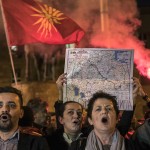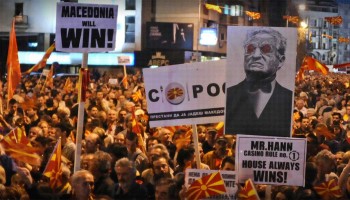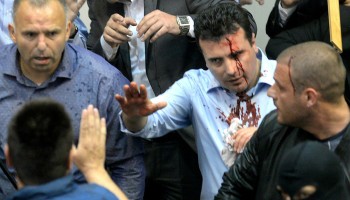Macedonian brothers Dimce and Risto -- both mechanics in a blue-collar neighborhood of the country’s capital of Skopje -- were once close.
When Dimce’s son Vladimir needed an urgent operation as a young child, Risto’s daughter Ana, who shared the same rare blood type, readily donated.
But that five-decade bond ended -- along with countless others -- in 2015, as the Balkan country descended into bitter political infighting.
That was the year allegations broke that the nationalist prime minister at the time, Nikola Gruevski, had ordered the wiretapping of tens of thousands of Macedonian citizens. The recordings, released by then-opposition leader Zoran Zaev, revealed alleged crimes among members of the governing party ranging from corruption to election rigging and extortion.
The resulting political crisis spurred street protests, an indecisive early election, violence in the parliament building and, on May 31, after months of deadlock the formation of a new government led by Zaev.
The political battles have also been waged in the media -- in brutal fashion. Gruevski’s VMRO-DPMNE party, in power for a decade, oversaw the closure and intimidation of much of the country’s mainstream media, which is now largely dominated by pro-VMRO outlets. On the other side, a smaller number of left-leaning outlets have supported Zaev’s Social Democrats. There is also a small and beleaguered independent media.
Added to the mix have been propaganda campaigns by Russian and Serbian intelligence and a foreign lobbying campaign by VMRO aimed in part at encouraging friendly coverage of the party in the foreign press.
In this toxic environment, the relationship between brothers Dimce and Risto didn’t stand a chance.
Dimce and his son Vladimir are both members of VMRO, and Vladimir works at the Public Procurement Office. He says he doubts he would have this job if he were not a party member.
On the other side, Risto’s daughter Ana works for a well-known liberal human rights NGO.
The brothers declined to be identified by their last name in this story, fearing repercussions for their children at work.
As news of the wiretapping broke in 2015, Gruevski counterattacked, accusing foreign intelligence services of manufacturing the recordings in order to “brutally destroy” his party and the country.
Some Macedonians believed him, others didn’t.
Outraged over what was on the tapes, thousands camped in front of the parliament for days, demanding Gruevski’s resignation and new elections. Risto’s daughter Ana was there.
Hundreds of others who believed Gruevski’s explanation occupied the space behind the parliament, demanding instead the resignation of Zoran Zaev, the opposition leader. Dimce’s son Vladimir was there.
Both crowds went home when the European Union persuaded Gruevski to step down and appoint an independent prosecutor to look into the wiretaps. In return, Zaev’s party ended its walkout of parliament.
The December 2016 elections resulted in a hung parliament, and more than five months without a government until Zaev formed his on May 31. The interregnum saw regular protests, and the storming of the parliament on April 27 by nationalists who beat Zaev and other lawmakers.
Amid all of this, the battle of ideas raged on.
As the special prosecutor investigated VMRO figures, independent outlets carried a steady stream of stories about corruption involving party figures. The response of nationalist media has been to shoot the messenger.
Meri Jordanovska, a Macedonian investigative journalist, told OCCRP that every time she broke a story that showed wrongdoing, see would be “crucified” by mainstream outlets.
“For example, when we were writing about money laundering involving a huge construction project, nobody talked about the corruption we found, nobody was even denying it,” she said, referring to a story she wrote in the weekly magazine Focus. “All they said in their media was: ‘She hates her country. That’s why she writes [this way] about a project the nation is so proud of.’”
The personal attacks were even echoed by her own relatives, she said.
“When they are told every day that you are a traitor, well, soon people start to wonder no matter how much they love you or trust you,” she said.
A common line of attack has been that VMRO’s critics and independent media outlets are intent on breaking up the country, where the restive Albanian minority has called for greater autonomy. In this narrative, billionaire philanthropist George Soros, whose Open Society Foundations finance both NGOs and government programs in Macedonia, is frequently featured as a villain.
Ljupcho Zlatev, a journalist from Vecer, a pro-VMRO daily, said the attacks on Soros were necessary as part of an effort to defend the country from “aggressive liberal global elites.”
“My job is not to defend criminals or something,” he said. “I am just protecting values. Conservative values.” He added that he saw the liberals as caring more about the rights of transgender people than the rights of workers.
The media war has filtered down to day-to-day life, as Risto and Dimce discovered amid the country’s intensifying conflict. The final straw came when they met for their mother’s funeral.
“We were burying our mother and we all had maybe too much to drink when [Dimce] said: ‘Poor mom. If she only did not [live to] see what your children have become,’” Risto recalled.
In pro-VMRO parlance, Risto’s daughter Ana, with her NGO job, was a “Sorosoid” - a tool of the billionaire. And that’s what Dimce called her.
“I couldn’t take it anymore,” Risto said.
After a short but intense argument, the brothers have not spoken to this day.
Risto’s son Vladimir explained his and his father’s position to an OCCRP reporter. “She works for Soros, it is clear,” he said, referring to his cousin Ana, who he called “manipulated.”
“As much as I love her, we all have to put our country first,” he said. Three years ago he offered to find Ana another job, but she refused, preferring to continue working for the NGO.
“Look at what they do,” he said. “They want gay rights, they defend Albanians, they are against the church…”
On the other side, Risto cannot understand why his brother would insult him and his child for the sake of what he sees as a corrupt party whose members only tried to stay in power to avoid going to jail.
“It is stupid that we fight over this,” he said. “But it’s not easy to stand that they look at you like you and your children did something wrong.”
Neither side is backing down.
When Risto’s wife died last year, Dimce didn’t show up to the funeral.
“That hurt,” Risto said. “That really hurt.”







